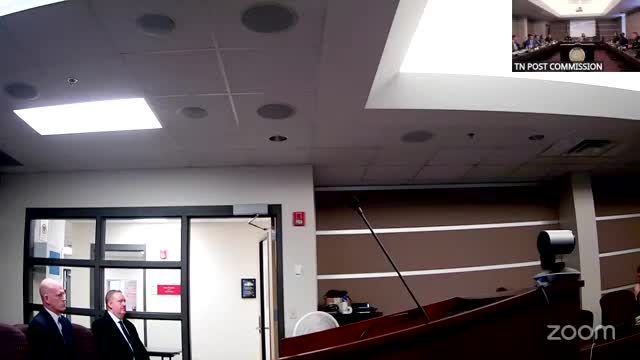Tennessee POST revokes certification of officer after hearing on undisclosed use of human growth hormone
Get AI-powered insights, summaries, and transcripts
Subscribe
Summary
The Tennessee Peace Officer Standards and Training Commission voted to revoke the certification of Jesse Calabaugh after hearing testimony that he used and purchased human growth hormone while post‑certified and gave inconsistent accounts to the Tennessee Highway Patrol during hiring and an internal investigation.
The Tennessee Peace Officer Standards and Training Commission voted on Feb. 21, 2025, to revoke the law‑enforcement certification of Jesse Calabaugh following a disciplinary hearing at the Tennessee Law Enforcement Training Academy in Nashville.
The Department of Commerce and Insurance, which brought the petition, presented evidence and the testimony of Sergeant Toby Carter of the Tennessee Highway Patrol’s Office of Professional Accountability. The department argued Calabaugh misled THP during pre‑employment screening and was later terminated for untruthfulness while employed by the Highway Patrol. Maribeth Nisley, associate general counsel for the Department of Commerce and Insurance, told the commission the department was asking that Calabaugh be decertified.
The commission’s administrative law judge, Stephanie Bergmeier, instructed members on their duties and on applicable law, saying, “You are the sole judges of the facts and will be applying the facts to the law in this case.” The commission heard opening statements, testimony from Sergeant Carter and then from Calabaugh, and received eight exhibits; portions of the record and several exhibits were protected under a court‑ordered protective order and discussed outside the public feed.
Sergeant Carter testified the Office of Professional Accountability opened an administrative investigation after receiving a complaint that Calabaugh had used or sold enhancement drugs. Carter said the allegation that Calabaugh sold steroids could not be corroborated, but that Calabaugh acknowledged use of an enhancement drug in interviews. The department entered a termination letter into the record, describing a probationary dismissal and citing violations of departmental general orders related to untruthfulness and unbecoming conduct.
Calabaugh testified he used what he believed to be human growth hormone (HGH) in connection with powerlifting competitions beginning in 2017. He described purchasing clear, unlabeled vials from a gym contact and buying syringes online. He said he used the product in blocks of about four weeks leading up to competitions and that he had discussed the use with a polygraph examiner during THP’s pre‑employment process. Calabaugh also testified he passed the polygraph.
On cross‑examination, Carter and commission members pressed Calabaugh about inconsistent statements in different interviews and application materials. Calabaugh acknowledged multiple versions of his account — saying he could definitively place use in 2017 but could not provide exact dates for later competitions — and that he had not had a prescription for the vials he received. Sergeant Carter testified he did not obtain or test a sample of the liquid and that the only evidence of use of an enhancement product came from Calabaugh’s statements.
In closing, the department argued that Calabaugh’s inconsistent statements and omissions on THP application forms and during internal investigation amounted to dishonesty warranting decertification. Calabaugh’s attorney, Shane Brasfield, said the Highway Patrol had hired Calabaugh after reviewing his documents, that the application questions were confusing, and that Calabaugh had completed THP training and related classes before termination; Brasfield urged the commission to “choose no action for decertification.”
After deliberation the commission moved, seconded and voted to revoke Calabaugh’s post certification. The commission’s final order — prepared under the commission’s rules and the Tennessee Uniform Administrative Procedures Act — will be filed and signed by the chair or vice chair as the commission directed. The record shows the commission adopted findings of fact and conclusions of law that the department had met its burden under applicable POST rules and revoked the respondent’s certification.
The hearing record includes a protective order: certain exhibits (identified in the technical record as exhibits 3–6 on the stipulated list) were filed under seal and portions of testimony and documents were heard in closed session. The record before the commission included a termination letter characterized as a probationary dismissal, the THP security‑clearance application and polygraph‑related documents, and internal affairs investigative materials admitted as evidence during the hearing.
The commission’s order memorializes the revocation and notes how members must prepare a written final order that sets out findings of fact, conclusions of law and policy reasons for the decision. It also permits the parties to seek reconsideration or other statutory review as provided under the commission’s rules and state administrative procedure law.
